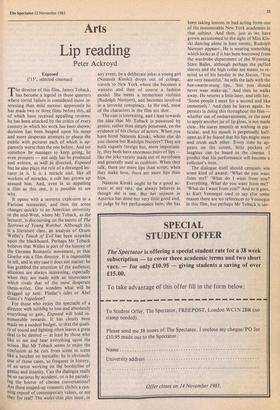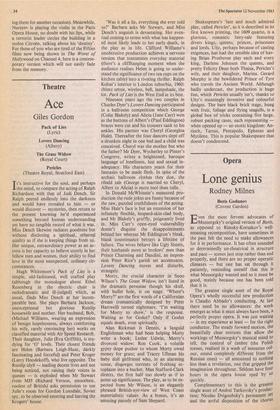Arts
Lip reading
Peter Ackroyd
Exposed ('15', selected cinemas)
The director of this film, James Toback, has become a legend in those quarters where torrid failure is considered more in- teresting than mild success: apparently he has made two or three films before this, all of which have received appalling reviews; he has been attacked by the critics of every country in which his work has been shown; derision has been heaped upon his more and more desperate attempts to please the public with pictures each of which is ap- parently worse than the one before. And yet somehow he manages to keep going, he even prospers — not only has he produced and written, as well as directed, Exposed but he also plays the role of a deranged lec- turer in it. It is a miracle and, like all workers of miracles, a cult has grown up around him. And, even in so appalling a film as this one, it is possible to see why.
It opens with a terrorist explosion in a Parisian restaurant, and then the scene changes quickly to an American university in the mid-West, where Mr Toback, as the lecturer, is discoursing on the merits of The Sorrows of Young Werther. Although this is a literature class, an analysis of Orson Welles's Touch of Evil has been scrawled upon the blackboard. Perhaps Mr Toback believes that Welles is part of the history of the German Romantic movement, or that Goethe was a film director. It is impossible to tell, and in any case it does not matter: he has grabbed the attention of the audience; allusions are always interesting, especially when they are made with an insouciance Which rivals that of the most desperate thesis-writer. One wonders what will be dragged up next: Pindar's odes or Abel Gance's Napoleon?
For those who enjoy the spectacle of a director with notheng to lose and absolutely everything to gain, Exposed will hold in- numerable rewards. It has clearly been Made on a modest budget, so that the quali- ty of sound and lighting often leaves a great deal to be desired — at least by those who like to see and hear everything upon the screen. But Mr Toback seems to enjoy the confusion as he cuts from scene to scene like a butcher on mescalin: he is obviously one of those cases, so frequent in history, of an artist working on the borderline of genius and insanity. Can the dialogue really be so vacuous by accident, or is he parody- ing the horror of cinema conversations? Are these souped-up romantic clichés a cun- ning expose of contemporary values, or are they for real? The wafer-thin plot must, in
any event, be a deliberate joke: a young girl (Natassia Kinski) drops out of college, travels to New York where she becomes a waitress and then of course a fashion model. She meets a mysterious violinist (Rudolph Nureyev), and becomes involved in a terrorist conspiracy. In the end, most of the characters in the film are shot.
The cast is interesting, and I lean towards the idea that Mr Toback is possessed by genius, rather than simply possessed, on the evidence of his choice of actors. When you have hired Natassia Kinski, whom else do you choose but Rudolph Nureycv? They are both vaguely foreign but, more important- ly, they both have enormous pairs of lips — like the joke variety made out of styrofoam and generally used as cushions. When they talk, there are more lips than script; when they make love, there are more lips than hips.
Natassia Kinski ought to be a good ac- tress: at any rate, she always behaves as though she is one. But her sojourn in America has done her very little good and, to judge by her performance here, she has been taking lessons in bad acting from one of the innumerable New York academies in that subject. And then, just as we have grown accustomed to the sight of Miss Kin- ski dancing alone in bare rooms, Rudolph Nureyev appears. He is wearing something which looks as if it has been borrowed from the wardrobe department of the Wyoming State Ballet, although perhaps the puffed sleeves and the high collar are meant to re- mind us of his heyday in the Sixties. 'You are very beautiful,' he tells the lady with the bee-swarm-stung lips, 'but you should never wear make-up.' And then he walks away. He returns a little later, and tells her, 'Some people I meet for a second and like immensely.' And then he leaves again, he persists in doing this throughout the film — whether out of embarrassment, or the need to apply another jar of lip gloss, is not made clear. He stares intently at nothing in par- ticular, and his mouth is perpetually half- open as if he feared that his lips might meet and crush each other. Every time he ap- pears on the screen, little pockets of laughter can be heard in the cinema. I predict that his performance will become a collector's item, The dialogue itself should certainly win some kind of award: 'What do you want from me?' What do I want from you? Everything. What do you want from me?' 'What do I want from you?' And so it goes, as Kurt Vonnegut used to say (for some reason there are no references to Vonnegut in this film, but perhaps Mr Toback is say-
ing them for another occasion). Meanwhile, Nureyev is playing the violin in the Paris Opera House, no doubt with his lips, while a terrorist leader circles the building in a stolen Citroen, talking about his 'destiny'. For those of you who are tired of the Fifties films now being shown in The Worst of Hollywood on Channel 4, here is a contem- porary version which will not easily fade from the memory.















































 Previous page
Previous page